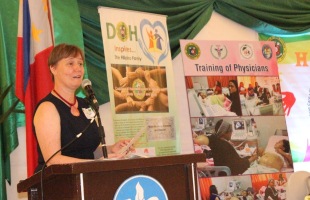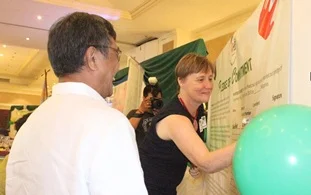
The World Health Organization (WHO), represented by Country Representative Dr Julie Lynn Hall, graced the High Impact 5 (HI-5) Summit led by the Department of Health Region 11 and commended the health workers, local government officials and other development partners last June 9, 2015 in Davao City.
Dr Hall cited the initial engagement of WHO Sub-National Initiative (WHO-SNI) in Malita, Davao Occidental and now will be implemented in eight other municipalities and one city in the Region, namely: Manay, Caraga (Davao Oriental); Tagum City, New Corella (Davao del Norte); Maco, Mabini, Pantukan (Compostela Valley); Sta Maria, Malita, Don Marcelino (Davao Occidental).
The WHO-SNI aims to strengthen the service delivery networks, local government stewardship, and empower the health workers on the ground “so that they will be able to deliver the quality health care that we know is needed and we know that people deserve,” says Dr Hall.

WHO-SNI is now poised to implement an intervention which aimed to reduce maternal and infant deaths in Davao Region. Dubbed as AcCESS for MNH (Accelerated Convergent Efforts on System Strengthening for Maternal and Newborn Health), WHO has secured funding for this from the Korean International Cooperation Agency (KOICA).
Together with DOH ASec Paulyn Jean B. Rosell-Ubial, Regional Director Abdullah Dumama, Davao del Norte Governor Rodolfo P. del Rosario and other key personalities from DILG, LGUs, development partners and NGOs, Dr Hall signed a symbolic Pledge of Support for HI-5 during the event.
Universal Health Care High Impact Five (UHC HI-5) is a strategy which aims to produce the greatest improvement in health outcomes and the highest impact on the priority, vulnerable population, with focus on five critical UHC interventions prioritizing the poor, providing tangible outputs which can be “felt” within a breakthrough period of 15 months through synchronized nationwide implementation of activities. These five UHC interventions include: maternal care, infant care, HIV/AIDS, and service delivery network.
“This is to make sure that the next generations are as healthy as they can be,” sums up Dr Hall.
